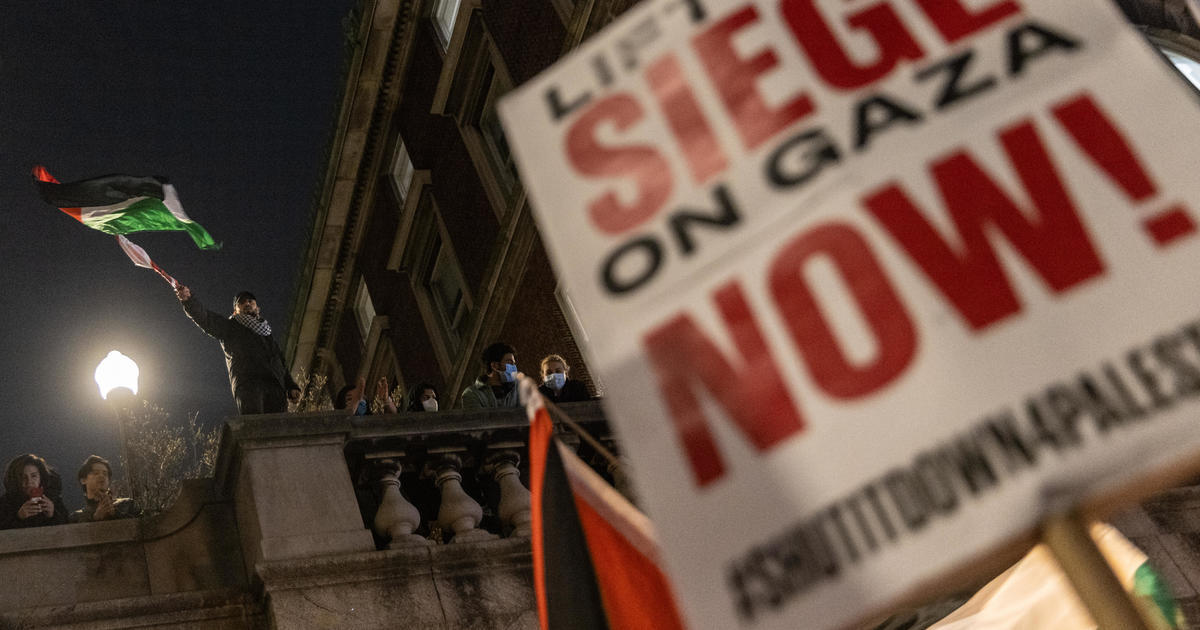Protestors Hit The Streets As NY Pols Push Legislation That Would Require Labels On Genetically Modified Food
NEW YORK (CBSNewYork/AP) -- Protesters rallied in dozens of cities Saturday as part of a global protest against seed giant Monsanto and the genetically modified food it produces, organizers said.
Organizers said ``March Against Monsanto'' protests were held in 52 countries and 436 cities, demonstrators waved signs that read ``Real Food 4 Real People'' and ``Label GMOs, It's Our Right to Know.''
The marches came at the same time as two bills were introduced in the New York Legislature to mandate that genetically modified food be labeled.
Genetically modified plants are grown from seeds that are engineered to resist insecticides and herbicides, add nutritional benefits or otherwise improve crop yields and increase the global food supply.
Most corn, soybean and cotton crops grown in the United States today have been genetically modified. But critics say genetically modified organisms can lead to serious health conditions and harm the environment. The use of GMOs has been a growing issue of contention in recent years, with health advocates pushing for mandatory labeling of genetically modified products even though the federal government and many scientists say the technology is safe.
The bill was sponsored by Dem Linda Rosenthal in the Assembly and Republican Kenneth LaValle in the Senate, The Daily News Reported.
"Clearly this is an issue that has found resonance with my constituents. When it comes to what you put into your body, it's important that, as a consumer, you know as much as possible," Rosenthal told The Daily News.
In the past this type of legislation has been defeated in California; but, published reports have shown momentum behind such bills to be growing in other states including Vermont, Maine, and Connecticut.
The `March Against Monsanto' movement began just a few months ago, when founder and organizer Tami Canal created a Facebook page on Feb. 28 calling for a rally against the company's practices.
``If I had gotten 3,000 people to join me, I would have considered that a success,'' she said Saturday. Instead, she said an ``incredible'' number of people responded to her message and turned out to rally.
``It was empowering and inspiring to see so many people, from different walks of life, put aside their differences and come together today,'' Canal said. The group plans to harness the success of the event to continue its anti-GMO cause.
``We will continue until Monsanto complies with consumer demand. They are poisoning our children, poisoning our planet,'' she said. ``If we don't act, who's going to?''
Monsanto Co., based in St. Louis, said that it respects people's rights to express their opinion on the topic, but maintains that its seeds improve agriculture by helping farmers produce more from their land while conserving resources such as water and energy.
Monsanto has argued that there is no available data linking genetically modified food products to health problems in humans, the Daily News reported.
Monsanto released the following statement on its website:
"The safety of our products is our first priority, and multiple health societies, hundreds of independent scientific experts and dozens of governments around the world have determined that foods and ingredients developed through biotechnology [or genetic modification (GM)] are safe."
The Food and Drug Administration does not require genetically modified foods to carry a label, but organic food companies and some consumer groups have intensified their push for labels, arguing that the modified seeds are floating from field to field and contaminating traditional crops. The groups have been bolstered by a growing network of consumers who are wary of processed and modified foods.
The U.S. Senate this week overwhelmingly rejected a bill that would allow states to require labeling of genetically modified foods.
The Biotechnology Industry Organization, a lobbying group that represents Monsanto, DuPont & Co. and other makers of genetically modified seeds, has said that it supports voluntary labeling for people who seek out such products. But it says that mandatory labeling would only mislead or confuse consumers into thinking the products aren't safe, even though the FDA has said there's no difference between GMO and organic, non-GMO foods.
Whole Foods says there is growing demand for products that don't use GMOs, with sales of products with a ``Non-GMO'' verification label spiking between 15 percent and 30 percent.
Activists in New York told the Daily News that humans should use restraint when it comes to GMOs and their health.
"Because the jury is still out on human health effects, I'd like to be able to take a cautious approach," Orell told the News. "Labels would allow me to do that," said Stacie Orell, Campaign Director for GMO Free NY.
(TM and © Copyright 2013 CBS Radio Inc. and its relevant subsidiaries. CBS RADIO and EYE Logo TM and Copyright 2013 CBS Broadcasting Inc. Used under license. All Rights Reserved. This material may not be published, broadcast, rewritten, or redistributed. The Associated Press contributed to this report.)
You May Also Be Interested In These Stories



